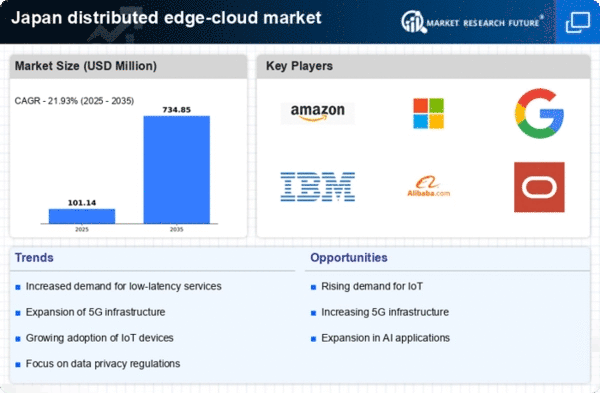Expansion of 5G Infrastructure
The rollout of 5G technology in Japan is significantly influencing the distributed edge-cloud market. With its promise of ultra-fast data transfer speeds and improved connectivity, 5G is expected to facilitate the deployment of edge computing solutions. This infrastructure expansion is likely to enhance the performance of various applications, including smart cities and industrial automation. Reports suggest that by 2026, 5G subscriptions in Japan could reach over 100 million, creating a fertile ground for the distributed edge-cloud market to thrive. The integration of 5G with edge computing is anticipated to drive innovation and efficiency across multiple sectors.
Increased Focus on Data Sovereignty
In Japan, there is a growing emphasis on data sovereignty, which is shaping the distributed edge-cloud market. As organizations become more aware of data privacy regulations and the need to keep sensitive information within national borders, the demand for localized edge computing solutions is rising. This trend is particularly relevant in sectors such as healthcare and finance, where compliance with stringent regulations is paramount. The distributed edge-cloud market is likely to benefit from this shift, as businesses seek to implement solutions that ensure data remains secure and compliant with local laws. This focus on data sovereignty could potentially lead to a market growth rate of around 20% over the next few years.
Rising Demand for Low Latency Applications
The distributed edge-cloud market in Japan is experiencing a notable surge in demand for low latency applications. As industries such as gaming, autonomous vehicles, and real-time data analytics expand, the need for rapid data processing becomes critical. This trend is particularly evident in sectors like finance and telecommunications, where milliseconds can impact performance and user experience. According to recent estimates, the market for low latency solutions is projected to grow by approximately 25% annually, indicating a robust appetite for edge computing capabilities. The distributed edge-cloud market is thus positioned to capitalize on this demand, providing solutions that enhance responsiveness and efficiency.
Adoption of AI and Machine Learning Technologies
The integration of artificial intelligence (AI) and machine learning (ML) technologies is becoming increasingly prevalent in the distributed edge-cloud market in Japan. These technologies enable organizations to process and analyze data at the edge, leading to improved decision-making and operational efficiency. Industries such as manufacturing and retail are leveraging AI-driven insights to optimize processes and enhance customer experiences. The distributed edge-cloud market is poised to see substantial growth as businesses invest in AI and ML capabilities, with projections indicating a potential increase in market size by 30% within the next five years.
Growing Interest in Sustainable Computing Solutions
Sustainability is emerging as a key driver in the distributed edge-cloud market in Japan. As organizations strive to reduce their carbon footprint and enhance energy efficiency, there is a rising interest in sustainable computing solutions. Edge computing can contribute to this goal by minimizing data transmission distances and reducing energy consumption. The distributed edge-cloud market is likely to see increased investments in green technologies, with companies aiming to align their operations with environmental standards. This trend may lead to a market growth of approximately 15% as businesses prioritize sustainability in their digital transformation strategies.
















